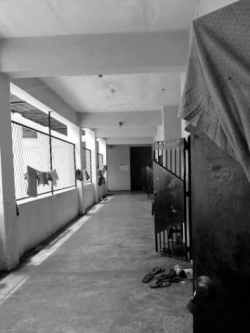Thailand: Spending teen years detained
13 January 2011|Molly Mullen, communications intern JRS Asia Pacific

Bangkok, 14 January 2010 – Looking at Divea, she seems like an average 18-year-old girl. Wearing a fashionable denim skirt with a t-shirt and long, black hair, she could easily fit in at her high school back in Sri Lanka.
But after speaking with Divea for a few minutes, you may forget that she is only 18. Unfortunately, she seems to have forgotten as well. After spending over a year detained in Bangkok’s Immigration Detention Centre (IDC), she says she has been forced to grow up fast.
“I miss my friends”, she said.
“When I was on the outside, I could still contact them (in Sri Lanka). I miss being in school and having the freedom to be young. Now I feel like I am over matured. Like we wouldn’t understand each other anymore”.
While she has grown up in detention, Divea was never allowed a care-free childhood. Her father was an independent politician in Sri Lanka, which made her family a target for the militant group The Liberation Tigers of Tamil Eelam (LTTE). Her father was followed by two police officers day and night, and her brothers were threatened on the way to school.
“Something terrible would have happened if we stayed”, Divea said.
“We can never go back and still, IDC is better than Sri Lanka”.
She made it to Thailand with her family in 2007 and she began working as a translator for a psychologist at the Bangkok Refugee Centre. This is where she became interested in some day studying psychology.
While Divea and her family are recognised refugees, they did not have valid visas. So she, like any other urban refugee or asylum seeker, was subjected to arbitrary arrest and indefinite detention.
Her family (including her parents, three sisters and brother) was arrested last year, along with 45 other Sri Lankans that day. She thought that because she had been recognised as refugee by the UN refugee agency (UNHCR), her family would be released.
When she realised her family would remain in detention until they are resettled to another country, she tried not to lose hope.
“When I first got to IDC, I would work with the kids, teaching them English and maths and I would study and read”, Divea said.
“Now I am scared that I have lost interest in studying altogether. All my friends are finishing secondary school and going to college. I am so far behind”.
JRS Asia Pacific works in five detention centres in three countries, offering material assistance (blankets, sanitary items and food), pastoral care, release-return support, counselling and medical assistance.
“After spending four years in Thailand, and one year in detention, I have no hope anymore. I don’t feel lonely or sad anymore. Just empty. My eight-year-old sister asks all the time, ‘When are we going to get out? When are we going to get resettled?’ and it makes me sad. I am sad that she still has hope because she is able to be disappointed”.
Her family was rejected for resettlement in Canada after waiting 14 months. They have now been waiting 19 months for a response from the United States.
After learning about her family being rejected from the Netherlands in December, Divea said, “I feel desperate. I don’t know what will become of me and my sisters”.
“I just want to be resettled to a new country with my family. I want to have freedom and I want to try to be a teenager and study again”, she said.
*name changed for protection


